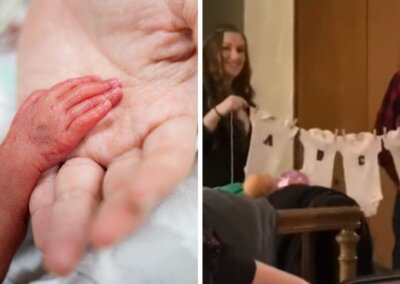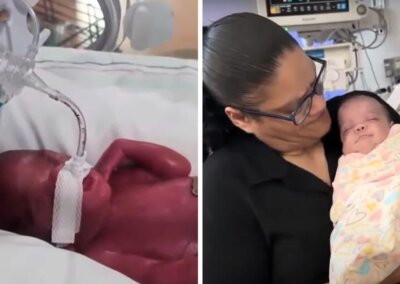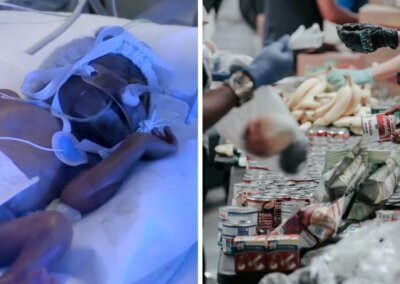A micro-preemie born weighing under two pounds has just graduated from high school after undergoing multiple surgeries as a baby.
Marc Mullings was born at just 25 weeks and spent the first four months of his life in a neonatal intensive care unit (NICU). He weighed just under two pounds, and his father’s wedding ring fit around his arm.
His parents were unable to hug him for months. His mother Alicia described the experience as “extremely scary”.
During his stay in hospital, Marc underwent several surgeries, including an emergency surgery for a brain bleed and a surgery to close a hole in his heart.
“The doctors sat us down and talked to us about his quality of life. They said we had to think: Do you want to put him through that?” Alicia said.
She shared how this comment upset her, saying “If Marc doesn’t have the surgery, he won’t even have a life, and I was so upset with the doctor”.
His parents now see Marc as a miracle
While doctors suggested that Marc might have severe cerebral palsy if he survived, he has thrived in physical activity as a young man, with an upcoming job as a strength and conditioning trainer.
“Watching him graduate was amazing. I was kind of lost for words. We were surprised that time flew by so fast, and we saw his progress from the NICU and then daycare. Now, he’s starting college this year”, Alicia said.
Marc himself shared “So far, life has been so unreal, and I feel so lucky and appreciate my parents for creating a life like this for me”.
“I’m just lucky for all the support around me, and I’m grateful”, he added.
Survival rates have improved for premature babies
At 25 weeks, Marc was born just after the current UK abortion limit, which is 24 weeks gestation. The last time the abortion limit was lowered in 1990, the improved survival rates for extremely prematurely born babies was one of the key considerations that motivated this change.
By the same logic, and informed by the improved survival rates for babies born at 22 and 23 weeks gestation, the abortion time limit should also be lowered now.
Key studies in recent years have documented the improving outcomes for these babies.
A 2008 study looking at survival rates for a neonatal intensive care unit in London found that neonatal survival rates at 22 and 23 weeks gestation had improved over time. In 1981-85, no babies who were born at these gestational ages survived to discharge. However, by 1986-90, 19% did and this increased to 54% in the period 1996-2000.
In the decade to 2019 alone, the survival rate for extremely premature babies born at 23 weeks doubled, prompting new guidance from the British Association of Perinatal Medicine (BAPM) that enables doctors to intervene to save premature babies from 22 weeks gestation. The previous clinical guidance, drafted in 2008, set the standard that babies who were born before 23 weeks gestation should not be resuscitated.
Spokesperson for Right To Life UK, Catherine Robinson, said “Congratulations to Marc on his graduation from high school! It is amazing to hear about the successes of premature children who grow up to defy the odds. It is thanks to his parents’ resolution to give him every chance at a good life that Marc is facing such a bright future today”.












